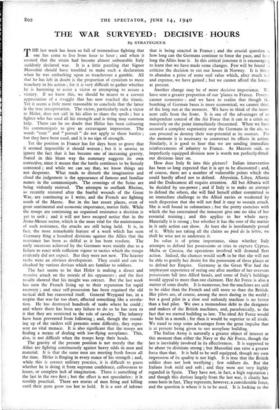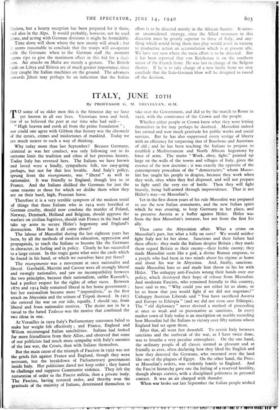THE WAR SURVEYED : DECISIVE HOURS
By STRATEGICUS
THE last week has been so full of tremendous fighting that one has come to live from hour to hour ; and when it seemed that the strain had become almost unbearable Italy suddenly declared war. It is a little puzzling that Signor Mussolini should have troubled to make such a declaration when he was embarking upon so treacherous a gamble. All that he has left in doubt is the proportion of cynicism to mere treachery in his action ; for it is very difficult to gather whether he is hastening to assist a victor or attempting to assure a victory. If we knew this, we should be nearer to a correct appreciation of a struggle that has now reached the titanic. Yet it seems a little more reasonable to conclude that the latter is the true interpretation. The victor, particularly such a victor as Hitler, does not call in his allies to share the spoils ; but a fighter who has used all his strength and is tiring may summon help. There can be no doubt that Hider has been colouring his communiques to give an extravagant impression. The words "rout " and " pursuit " do not apply to these battles ; but they have been used, and it is no sign of strength.
Yet the position in France has for days been so grave that it seemed impossible it should worsen ; but it is unwise to ignore the fact that it has become one of increasing gravity. Stated in this blunt way the summary suggests its own corrective, since it means that the battle continues to be fiercely contested ; and while we can say that, we know things are not desperate. What tends to disturb the imagination and cloud the judgement is the appearance of famous and familiar names in the communiques. The crossings of the Seine are being violently resisted. The attempts to outflank Rheims, so recently restored after the fearful wounds of the Great War, are continuing as I write, and the French are fighting south of the Marne. But in the last resort places, even of great sentimental and economic importance, matter little. While the troops are continuing an organised resistance a decision is yet to seek ; and it will not have escaped notice that in the Aisne-Meuse sector, which is the most vital for the maintenance of such resistance, the attacks are still being held. It is, in fact, the most remarkable feature of a week which has seen Germany fling a hundred divisions against the Allies that the resistance has been as skilful as it has been resolute. The early successes achieved by the Germans were mainly due to a failure to react with sufficient vigour to tactics which the troops evidently did not expect. But they were not new. The heavier tanks were an obvious development. They could and can be checked by various devices which are familiar to soldiers.
The fact seems to be that Hitler is making a direct and massive attack on the morale of his opponents ; and the first results showed that his insight was correct. But the last week has seen the French living up to their reputation for rapid recovery ; and once self-possession has been regained the old tactical skill has reasserted itself. General Weygand has, in a respite that was far too short, effected something like a revolu- tion. He has destroyed hundreds of tanks where he could ; and where there has been any failure to do so he has seen to it that they are restricted to the role of cavalry. The infantry have been prevented from following ; and, though the round- ing up of the raiders still presents some difficulty, they repre- sent no vital menace. It is also significant that the troops are finding a means of dealing with low-flying aeroplanes. This, also, is not difficult when the troops keep their heads.
The gravity of the present position is not merely that the Allies are fighting continuously against heavy odds in men and material. It is that the same men are meeting fresh forces all the time. Hitler is flinging in every ounce of his strength ; and, while this is correct military practice, it is difficult to guess whether he is doing it from supreme confidence, callousness to losses, or complete lack of imagination. There i; something of the last in the two first ; but the effect is not speculative: it is terribly practical. There are stories of men firing and killing until their guns grow too hot to hold. It is a sort of inferno that is being enacted in France ; and the crucial question ,s how long can the Germans continue to force the pace, and hi long the Allies bear it. In this critical juncture it is encouragt to learn that we have made some changes. Few will be found ,k) criticise the decision to cut our losses in Norway. It is bitter to abandon a prize of some real value which, after much tog and expense, we have gained ; but we cannot afford the luxury at present.
Another change may be of more decisive importance. V have sent a greater proportion of our 'planes to France. Paver cannot economise ; and we have to realise that though 1', bombing of German bases is more economical, we cannot thin, of the long run at the moment. We have to think of the immi- nent calls from the front. It is one of the advantages of an independent control of the Air Force that it can in a crisis act massively on the point immediately threatened. When we have secured a complete superiority over the Germans in the air, we can proceed to destroy their war-potential at its sources. For the moment it is necessary to counteract its effects in action. Similarly, it is good to hear that we are sending immediate reinforcements of infantry to France. As Maurois said, an imperfectly equipped division now is worth ten perfectly-fitted- out divisions later on.
How does Italy fit into this picture? Italian intervention has been so long expected that it is apt to be discounted ; and, of course, there are a number of vulnerable points which she could hardly afford not to defend. Abyssinia, Libya, Albania and the Dodecanese all require attention. All but Albania will be decided by sea-power ; and if Italy is to make an attempt to defend the others, she will find herself either committed to an immediate challenge to the Allied navies or weakened by such dispersion that she will not find it easy to sustain attack. She is well found in submarines ; but the pretty exercises with which she has entertained the innocent give one no idea of her essential training ; and this applies to her whole navy. Materially it is strong ; but whether it has the root of the matter in it only action can show. At least she is inordinately proud of it. While not taking all the claims au pied de la lettre, we shall be wise not to underrate it.
Its value is of prime importance, since whether Italy attempts to defend her possessions or tries to capture Cyprus, Malta or Corsica, the operations involved will demand fleet action. Indeed, the chances would scut to be that she will not be able to gratify her desire for the possession of these places or to defend her Empire. Germany in the Great War had the unpleasant experience of seeing one after another of her overseas possessions fall into Allied hands, and some of Italy's holdings would appeal to more than one claimant. Her Air Force is also a matter of some doubt. It is numerous, but the machines are said to be older than the French and still more so than the British. Her pilots are, of course, among the most daring in the world ; but a good pilot in a slow and unhandy machine is no better than a bad pilot. We owe a tremendous debt to the designers and makers of the British machines, and, paradoxically, to the fact that we started building so late. The ideal Air Force would be built in a month ; for then it would be superior to all rivals. We stand to reap some advantages from the great impulse that is at present being given to our aeroplane building.
The Italian Army is naturally a greater object of interest at this moment than either the Navy or the Air Force, though the last is inevitably involved in its effectiveness. It is supposed to be about 70 divisions strong ; but Mussolini can raise a greater force than that. It is held to be well equipped, though my own impression of its quality is not high. It is true that the British soldier does not look terrifying ; few soldiers do. But the Italians look mild and soft ; and they were not very highly regarded in Spain. They have not, in fact, a high reputation ; and though this derives largely from the last war, it clearly has some basis in fact. They represent, however, a considerable force, and the question is where it is to be used. It is looking to the Riviera, but a hearty reception has been prepared for it there, nd also in the Alps. It would probably, however, not be used alone, and acting with German divisions it might be formidable. Time alone will show where the new enemy will attack ; but it seems reasonable to conclude that the troops will co-operate with the Germans when to the German staff the moment ,eems ripe to give the maximum effect in this bid for a deci- sion. Air attacks on Malta are merely a gesture. The British raids on Libya and Eritrea are of much greater importance, since they caught the Italian machines on the ground. The advances towards Jibuti may perhaps be an indication that the Italian effort is to be directed mainly in the African theatre. It seems an unconsidered strategy, since the Allied resources in this direction must be greatly superior to those of Italy, and any- thing which would bring them into play would assist in turning to productive action an accumulation which is at present idle. We have not seen where the main effort is to be directed. But it has been reported that von Reichenau is on the southern sector of the French front. He was last in charge of the Belgian theatre. If he is to take charge of a new battle front we may conclude that the Italo-German blow will be designed to round off the decision.































 Previous page
Previous page